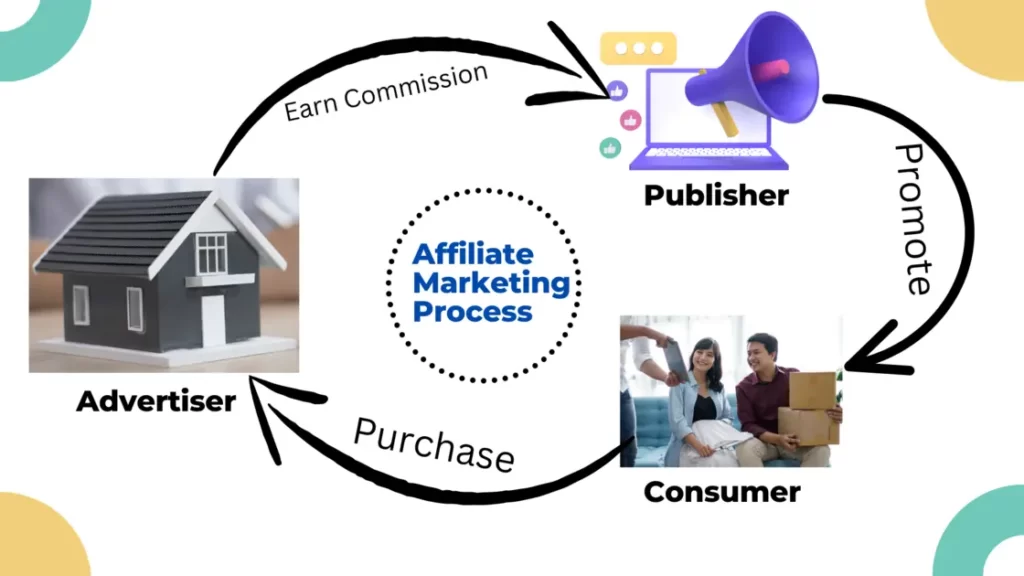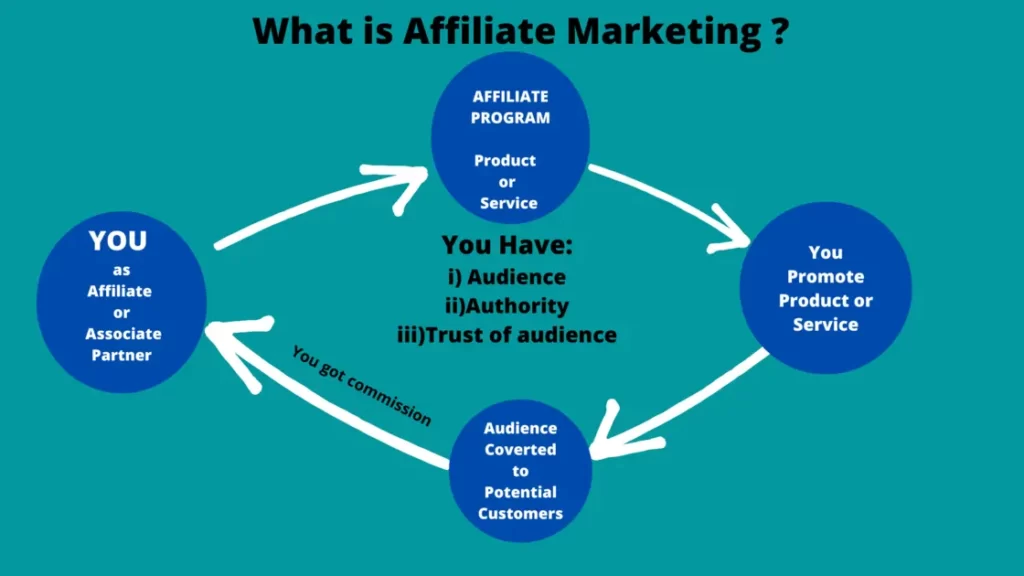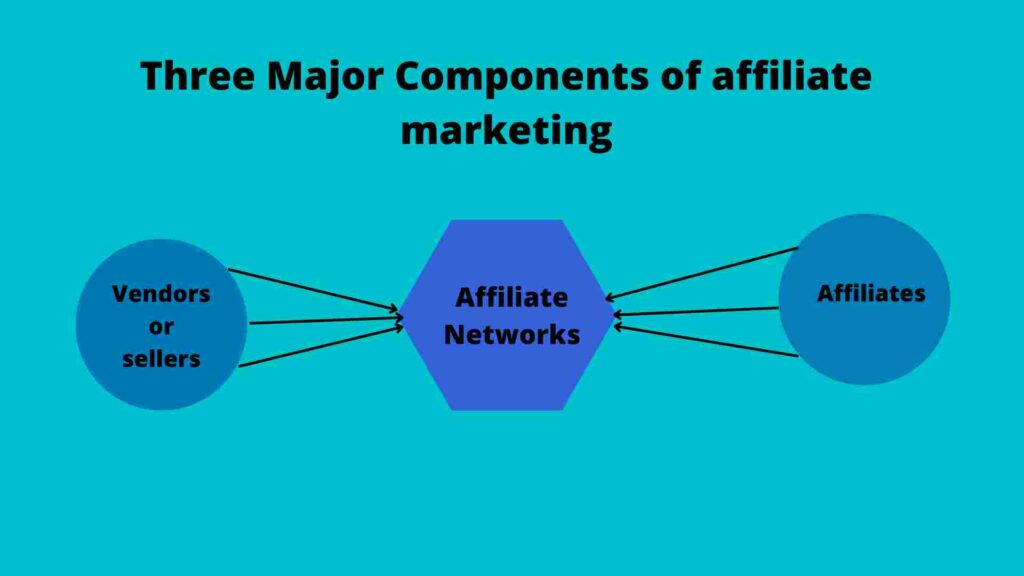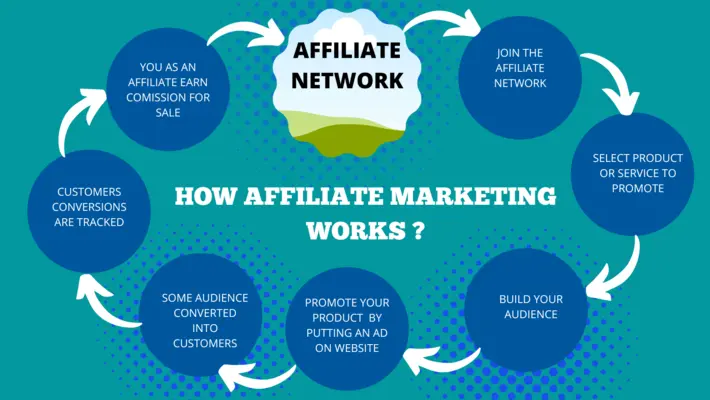Affiliate marketing offers an inexpensive, manageable, and flexible approach that positively impacts your business and brand as a whole.
Definition and overview:
Affiliate marketing is a process in which an affiliate will promote a company’s products and services, rewards one or more affiliates for each visitor or customer brought in by the affiliate’s own marketing strategy and efforts and receives a commission if the affiliate achieves a sale. In this article, we will look at the basics of the subject, what are the major components, main parameters to gain success in affiliate marketing.
After reading this article, you will be able to understand what motivates you to be an affiliate marketer. We shall also discuss some of the important factors when considering this important component of digital marketing.
Affiliate marketing is a form of advertising where you promote a product or services of any business or company and convert this into a sale and get some commission in return.
Affiliate marketing is a type of performance-based marketing in which an Affiliate Network rewards affiliates for each visitor or customer brought by the affiliate and converted into a sale with his marketing efforts and strategy.
While the process might sound simple, affiliate marketing can actually be complicated. There are many different strategies and techniques you can use to make your business successful.
Affiliate Marketing Process
Overall success is needed for building relationships between three distinct parties:

Advertiser:
The first party, commonly referred to as the advertiser or merchant, or seller, is the party that actually sells the product or service. Advertisers are those who own the products or services advertised through affiliate marketing.
This is usually accomplished through affiliate networks. Advertisers typically provide links, banners, text, and content used to promote their products. Advertisers are interested in increasing sales, and to do so they need to attract quality publishers. This is a network page for affiliates.
They usually have affiliate programs and it’s up to you to claim your spot on the website and sell the products. A product or service can be a physical product, a mobile phone, a computer or laptop, or even an intangible item such as an online course.
Publisher:
The other party is the publisher and more commonly the affiliate he is called the marketer. As an individual, you work with merchants to make sales for a commission. They contract and try to drive traffic in the form of links, advertisements, or in some cases unique phone numbers that you put on your website.
Advertisers and Affiliates have a partner relationship that is highly strategic as both need to make money to maintain the relationship. Both parties should work so closely with each other that those need to be on the same page regarding roles, responsibilities, and profit. You can also assign a unique code to each publisher to track each publisher’s sales and pay commission accordingly.
Publishers advertise directly to consumers and are usually the first point of contact in the sales process. However, their role is only to drive traffic and drive sales for their products. Returns and refunds are handled by the advertiser following the normal online sales process.
Consumers:
Hopefully, there are finally consumers or parties who buy your product. Therefore, the affiliate-consumer relationship must be based on trust. Consumers complete the relationship triangle by interacting with your marketing efforts such as clicking or tracking URLs links and ads and moving further to the publisher’s sales funnel.
When they buy something or perform an action agreed between partner and merchant, each gets a share of the exchange. As an affiliate, you post content or run affiliate advertising that encourages consumers to purchase from a retailer.
All three groups focus on relationships created by affiliates and receive products or payments through you. Of course, you also get paid when a purchase is completed. Knowing how each plays a role will give you a better understanding of how the whole affiliate marketing process works.
Set up affiliate marketing techniques to build and promote your audience. Using various technologies and platforms, merchants can track when you as an affiliate have sent a customer and make payment when a customer purchases a product or service. As a third-party brand, you have no control over what we sell or the price at which we sell, but we also have less risk in this process. When all aspects of affiliate marketing work together, all are beneficiaries of the parties.
Consumers receive goods, merchants generate revenue, and affiliates receive commissions for generating sales. In this complete process, if you do well by building stronger relationships with all three stakeholders can pay off in the long run by following a consistent strategy.
Main parameters in Affiliate Marketing
You must have three main parameters to accomplish the process:

Audience
Affiliates often have a very specific audience they are selling to and generally follow the interests of that audience. This creates a defined niche or personal brand that helps the affiliate attract consumers who are most likely to act on the promotion.
The most effective way to expand your audience is by building your brand credibility. You can do this by making sure you have a focused topic or niche and sticking to it. This will signal to customers that you only provide quality content.
One of the first steps to becoming an authority in your niche is understanding your audience. What are their specific interests? What problems do they have? What products and services are they interested to buy? Understanding your niche and the market you are in is the real key to success.
If you can become an authority in your niche, you don’t have to worry about SEO and traffic because you will naturally attract loyal followers. When it comes to affiliate marketing, there is a major difference between an “expert” and an “authority.” Anyone can become an expert on a given topic by reading books and publications to build knowledge.
When someone has authority, their word can actually become law. Audiences heed the advice of authorities in a field without hesitation because they command great respect and admiration from them. I believe it will really help if you are really interested in your place. Spending hours reading about something you find boring can be quite a chore. Of course, you can outsource content creation and other aspects of your affiliate marketing business, but you’ll still need to get involved and develop some knowledge of the niche you’re working in.
Authority
To become an authority, you obviously need to know a lot about your niche, but what else is crucial? You need to show your presence where most of the people in your niche spend most of their time.
An obvious place to start your journey to becoming an authority in your niche is to look to someone who already got trust as such. You can learn a lot by following gurus and champions who already have thousands of loyal followers. Amazon is often a good place to start when it comes to government investigations.
Following current authorities will guide you in the best way to enter the market and also help you promote your product idea. If you have a Facebook page, you’ll find this to be an effective way to reach your market. A specific area (niche) you can focus on and develop a reputation. Once you know what works in your niche, you can develop your own style, approach, and strategy.
Trust of Audience
How can you show that you are credible, competent, and trustworthy? Gain trust online may seem difficult. You know that your friends, your clients, and your colleagues trust your advice. This seems mostly different on the internet.
“Knowledge is great. Competence is great. But the combination of both encourages people to trust you and increases your powers of enchantment.” — Guy Kawasaki
First of all , you should show your audience that they can rely on you to provide regular, quality content. That should keep them coming back. As an honest affiliate marketer who wants to build trust, you should talk about the positives and negatives of any affiliate product you choose to promote.
This type of approach sends a clear signal to your audience (readers) that you are here to provide real value and not just sell the product or service.
Online, you can’t assume trust is automatically established. You need to actively build your trust, instead.
What are the major components of Affiliate Marketing?
Following are three major components in affiliate marketing:

Vendors or Sellers
Affiliate marketing can be an especially good option if you’re not ready to create your own product or service, but you want to serve your audience by recommending products that may be helpful to them and decide to choose best from them.
A seller is a seller, marketer, product developer, or retailer of the products being sold, whether a sole entrepreneur or a large corporation. Products may be physical items i.e household goods or services i.e. online tutorials. The Seller, also known as Brands, may not be actively involved in marketing, but is an affiliate. He may also benefit from revenue sharing related to marketing. By listing your products on our marketplace, you will have instant access to quality affiliates who can send you targeted traffic and bring you even more customers and sales. Make it easy for affiliates to promote your offer by creating an attractive affiliate support page with links to all necessary promotional tools and materials.
Affiliate Networks
Affiliate networks are groups of companies that offer compatible or complementary products and often refer potential customers to each other. You can offer cross-promotions and encourage customers who have used your services to consider services offered by your partners. While many brands work directly with affiliate marketing specialists, some brands choose to outsource to specialized affiliate marketing networks. These aggregate multiple products from different creators into their single bigger database, allowing affiliates to choose what to promote. These affiliate networks make life easier for developers by eliminating the need to communicate with potential sellers (affiliates). Brands don’t have to set up systems to collect data, making sure the right people get paid for the sales they drive. The best affiliate programs simplify the passive income process and make life easier for affiliates.
The Affiliate Network is also beneficial for affiliate marketers who want to promote multiple products without having to work with each merchant individually.
Affiliates or Advertisers
An affiliate is someone who owns a product or service promoted through affiliate marketing. Advertisers are interested in increasing sales, and to achieve this they need to attract quality publishers. The first question when getting started with affiliate marketing is whether to sign up as an affiliate partner or as an advertiser. If you have your own business and want to get into the affiliate industry, the next step is to join an affiliate network. More broadly, some affiliate networks treat both affiliate partners and advertisers as the same person.
Advertisers may also be known as distributors, retailers, or brands. Affiliate marketing should be an extension of your digital marketing efforts for earning money online. As part of affiliate marketing channels, there are companies that drive traffic and leads to their websites. These companies receive a commission only when a sale is generated for the affiliate networks.
